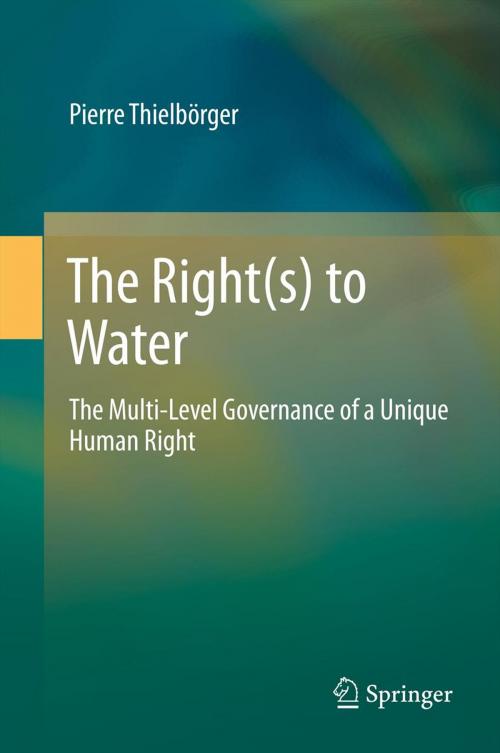The Right(s) to Water
The Multi-Level Governance of a Unique Human Right
Nonfiction, Reference & Language, Law, International, Science & Nature, Science, Biological Sciences, Environmental Science, Social & Cultural Studies, Political Science| Author: | Pierre Thielbörger | ISBN: | 9783642339080 |
| Publisher: | Springer Berlin Heidelberg | Publication: | September 30, 2013 |
| Imprint: | Springer | Language: | English |
| Author: | Pierre Thielbörger |
| ISBN: | 9783642339080 |
| Publisher: | Springer Berlin Heidelberg |
| Publication: | September 30, 2013 |
| Imprint: | Springer |
| Language: | English |
Politicians and diplomats have for many years proclaimed a human right to water as a solution to the global water crisis, most recently in the 2010 UN General Assembly Resolution “The human right to water and sanitation”. To what extent, however, can a right to water legally and philosophically exist and what difference to international law and politics can it make? This question lies at the heart of this book. The book’s answer is to argue that a right to water exists under international law but in a more differentiated and multi-level manner than previously recognised. Rather than existing as a singular and comprehensive right, the right to water should be understood as a composite right of different layers, both deriving from separate rights to health, life and an adequate standard of living, and supported by an array of regional and national rights. The author also examines the right at a conceptual level. After disproving some of the theoretical objections to the category of socio-economic rights generally and the concept of a right to water more specifically, the manuscript develops an innovative approach towards the interplay of different rights to water among different legal orders. The book argues for an approach to human rights – including the right to water – as international minimum standards, using the right to water as a model case to demonstrate how multilevel human rights protection can function effectively. The book also addresses a crucial last question: how does one make an international right to water meaningful in practice? The manuscript identifies three crucial criteria in order to strengthen such a composite derived right in practice: independent monitoring; enforcement towards the private sector; and international realization. The author examines to what extent these criteria are currently adhered to, and suggests practical ways of how they could be better met in the future.
Politicians and diplomats have for many years proclaimed a human right to water as a solution to the global water crisis, most recently in the 2010 UN General Assembly Resolution “The human right to water and sanitation”. To what extent, however, can a right to water legally and philosophically exist and what difference to international law and politics can it make? This question lies at the heart of this book. The book’s answer is to argue that a right to water exists under international law but in a more differentiated and multi-level manner than previously recognised. Rather than existing as a singular and comprehensive right, the right to water should be understood as a composite right of different layers, both deriving from separate rights to health, life and an adequate standard of living, and supported by an array of regional and national rights. The author also examines the right at a conceptual level. After disproving some of the theoretical objections to the category of socio-economic rights generally and the concept of a right to water more specifically, the manuscript develops an innovative approach towards the interplay of different rights to water among different legal orders. The book argues for an approach to human rights – including the right to water – as international minimum standards, using the right to water as a model case to demonstrate how multilevel human rights protection can function effectively. The book also addresses a crucial last question: how does one make an international right to water meaningful in practice? The manuscript identifies three crucial criteria in order to strengthen such a composite derived right in practice: independent monitoring; enforcement towards the private sector; and international realization. The author examines to what extent these criteria are currently adhered to, and suggests practical ways of how they could be better met in the future.















